Chimamanda Ngozi Adichie
Meg Wolitzer’s The Female Persuasion (Chatto) is wonderfully dense and wise, a page-turner that succeeds both at character and ideas. It felt true to life.
Cuz: The Life and Times of Michael A (Bodley Head) by Danielle Allen, a memoir about the loss of a beloved cousin, is unbearably moving. It illuminates the injustice often meted out to young black men by the American criminal justice system.
Uzodinma Iweala’s Speak No Evil (John Murray), in which a young Nigerian American comes out as gay, is a coming of age story about the difficult, churning mix of family expectations. It is elegant and elegiac, and evokes Washington DC with subtle power.
John Banville
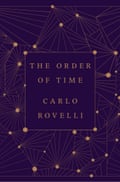
The Years by Annie Ernaux (Fitzcarraldo, translated by Alison Strayer) is a remarkable work, a truly innovative autobiography that opens new ways of remembering and recuperating the past.
The Long Take, by Robin Robertson (Picador), is a narrative in verse set in the immediate post-war years in America, that is at once heartbreaking and bracing. Think of it as the best black and white 1940s movie you will ever encounter in print.
The Order of Time, by Carlo Rovelli (Allen Lane, translated by Erica Segre and Simon Carnell), hardly seems like pool-side reading, but anyone with the least interest in the science of the physical world will be by turns astonished, baffled and thrilled by what Rovelli has to say about the true nature of time, which has little in common with our everyday conception of it. Rovelli is the poet of quantum physics.
Seamus Heaney 100 Poems (Faber) is an essential collection, which the poet meant to make before he died, and which the Heaney family have now completed. A feast of beauty.
Julian Barnes
I’ve greatly enjoyed two group biographies: Agnès Poirier’s rich and funny Left Bank (Bloomsbury), about cold rooms and hot ideas in postwar Paris; and Martin Gayford’s wise and generous Modernists and Mavericks (Thames & Hudson), about artists in London from 1945 to 1970. And what to read in homage to Philip Roth? Maybe American Pastoral.
Sebastian Barry
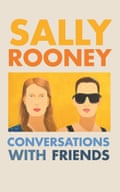
Mark O’Connell’s To Be a Machine (Granta), a very lively book about transhumanism, won the Wellcome prize. Sally Rooney is 27 and so won’t be worrying about mortality – she entered the landscape fully fledged in the now traditional Irish manner, and with great power, – like Katherine Mansfield and Elizabeth Bowen fused together – with Conversations with Friends (Faber). Just in case it gets lost in the newer dazzle, it’s worth mentioning again Red Dirt (Head of Zeus, 2015) by EM Reapy, which won the Rooney prize, an Irish stormer set in Australia.
William Boyd
I’m lucky enough to be reading Only to Sleep by Lawrence Osborne (out from Hogarth in September). A brilliant Raymond Chandler continuation novel with an ageing Philip Marlowe. Osborne and Chandler are a perfect match. Luke Kennard’s wit and astonishing virtuosity, so present in his poetry, have safely made the journey to his beguiling first novel The Transition (4th Estate): very funny, gimlet-eyed observation. Talking of poetry, Michael O’Neill’s latest collection Return of the Gift (Arc) is wise, lucid and pitch perfect.
Mary Beard
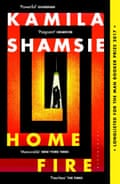
I just read Kamila Shamsie’s Home Fire (Bloomsbury). It’s brilliant in itself, but it also made me rethink Sophocles’s Antigone, on which it is loosely based. For some high-fibre holiday reading, I shall be packing Josephine Quinn’s In Search of the Phoenicians (Princeton), which dares to ask whether that famous ancient people really existed, and promises to expose the modern fantasies and ideologies that created them.
James Bridle
Broad Band (Portfolio) is a brilliantly written and necessary history of our foremost cultural technology by Claire Evans. It illuminates the occluded contributions of many women to the medium over more than 150 years, and transforms our understanding in doing so. From mathematicians to community managers, engineers to speleologists, Evans shows how the internet’s past, present and future are all utterly contingent upon its radical diversity.
Daniel Trilling has spent years tracing the routes taken by migrants from across Africa and the Middle East to Europe, meeting people and keeping in touch with them along the way: in camps, in cafes, and on Facebook. In Lights in the Distance (Picador) he tells their stories – or, more often, allows them to tell their own – calmly, clearly and deeply affectingly, never losing sight of the violence, brutality and pervasive racism that underlies and maintains the present situation.
Kayo Chingonyi
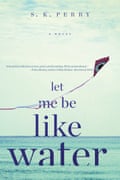
Let Me Be Like Water by SK Perry (Melville House) is a wonderful debut novel about how we find our feet again after a bereavement. It’s one of the best evocations of the grieving process I’ve read and is written in a fluid engaging style that draws you in to the protagonist Holly’s world.
There is not a word wasted in Fondue, the second collection of poems by AK Blakemore (Offord Road). I was struck by Blakemore’s gift for crafting memorable and devastating images that stay in the mind long after you’ve closed the book.
I saw Michael Donkor read at Brixton library recently and was enthralled by the extract he shared from his debut novel Hold (4th Estate), which moves between London and Ghana. I am looking forward to reading it in full.
Jonathan Coe
Far and away the funniest (and saddest) new book I’ve read this year is The Collected Letters of Flann O’Brien (Dalkey Archive), although I’m slightly reluctant to suggest that anybody packs this 600-page doorstop in their beach bag. Otherwise, having just finished writing a novel myself, I’m eager to dive back into other people’s fictional worlds, and am looking forward, equally, to Whistle in the Dark (Viking) by Emma Healey – which I’m told is even better than the excellent Elizabeth Is Missing – Old Baggage (Doubleday) by Lissa Evans (a novel of the suffragette movement that promises to be both warm and funny) and, for a bit of cold-eyed post-Brexit satire, Perfidious Albion (Faber) by Sam Byers.
Anne Enright
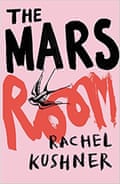
I am really enjoying Catherine Lacey’s short stories Certain American States (Granta) so will read her first novel Nobody Is Ever Missing to catch up. She is playful and smart, one of a generation of American women who seem entirely unafraid. Rachel Kushner’s The Mars Room (Jonathan Cape) shows what happens when a smart writer gets truly serious. It is a necessary and compelling book, and this year’s must read. I will also bring proofs of Robert Alter’s translation of the Bible (out from Norton in December), the first single author translation ever to be published, and Human Relations and Other Difficulties (Profile), a collection of essays by Mary-Kay Wilmers, whose intelligence I find endlessly opaque and interesting.
Lara Feigel
This is a brilliant summer for books by women: novels, memoirs and poems that address the difficult questions in women’s lives from an intimate perspective, but also with an unsentimental, distancing acuity and a preparedness to invent new forms for writing and for living. Three that seem to speak to each other in this respect are Deborah Levy’s game-changing The Cost of Living (Hamish Hamilton), Rachel Cusk’s Kudos (Faber) and Sheila Heti’s Motherhood (Harvill Secker). I also love Kathyrn Maris’s new poetry collection The House With Only an Attic and a Basement (Penguin), which tackles motherhood and family life with a comic thoughtfulness that’s unusually open to cruelty and that can rise and fall easily between the heroic and the bathetic. And right now, the book that’s really gripping me, and making me start again in thinking about many things, is Silver Press’s reprint of Nell Dunn’s 1965 Talking to Women, a series of artfully transcribed conversations with 10 of her friends. What’s striking, reading this, is how much has changed but also how little. And, unusually, the lack of change doesn’t feel depressing, reading these interviews, because there’s a pleasure in feeling so connected to these women across the decades. Also, there’s a kind of satisfaction in feeling that it’s just as important to keep asking the questions she asked about how we live, and why, and it makes me grateful that we have Cusk and Heti and Levy and Maris still asking them.
Aminatta Forna
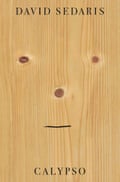
In Calypso (Little, Brown), David Sedaris’s essays marry meditations on family, suicide, grief and mortality with the hazards of bodily functions and frequent travel for his massively popular public readings. Sedaris is as much standup comic as writer, making this a great audio and one for the car journey. I’m currently reading The Female Persuasion by Meg Wolitzer, highly relevant in this fourth wave feminism moment and quietly gripping. I shall also be packing What It Means When a Man Falls from the Sky (Tinder) by Lesley Nneka Arimah, whose New Yorker short stories I have enjoyed. Tsitsi Dangaremba’s This Mournable Body (Graywolf) isn’t out until August, but I shall read it before summer’s end.
Mohsin Hamid
Nassim Nicholas Taleb’s Antifragile (Penguin) really made me think about how I think. I am also rereading Homer’s Iliad (the Robert Fitzgerald translation) and making my way through Susan Wise Bauer’s History of the Ancient World (Norton).
Yuval Noah Harari
The Road to Unfreedom (Bodley Head) by Timothy Snyder is a brilliant and disturbing analysis of the rise of authoritarianism in Russia, Europe and the US in the second decade of the 21st century. Essential reading for anyone wishing to understand the political crisis currently engulfing the world.
In Enlightenment Now (Allen Lane), Steven Pinker extols the amazing achievements of modernity, and demonstrates that humankind has never been so peaceful, healthy and prosperous. There is of course much to argue about, but that’s what makes this book so interesting.
Yuval Noah Harari’s new book, 21 Lessons for the 21st Century, will be published on 30 August by Jonathan Cape.
David Hare
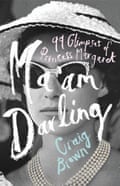
I’m sure Rachel Kushner’s The Mars Room is going to be great – at least if The Flamethrowers is anything to go by. In Ma’am Darling, 99 Excerpts from the Life of Princess Margaret (4th Estate), Craig Brown achieves the impossible by finding a tone in which to write about monarchy. Not bitchy, not snide, not angry, but not fawning nor deferential either. Just funny.
Jess Kidd
I am rollicking through Pretend I’m Dead by Jen Beagin, which is one of the funniest, most twisted and freshest things I’ve read in a long time. It follows the fortunes of Mona, who cleans houses and falls for a man she calls Mr Disgusting. Beagin combines deep compassion and irreverent humour to create characters with nasty, wonderful, human flaws. Helen Barrell’s Fatal Evidence, Professor Alfred Swaine Taylor and the Dawn of Forensic Science is an engrossing read. It follows the career of Taylor, a remarkable scientist who gave evidence at the trial of William Palmer, “The Rugeley Poisoner”, pioneered the study of forensic medicine and let Charles Dickens nose around his laboratory. Barrell explores Taylor’s (occassionally bizarre) cases, his public and private persona and his wide-ranging interests, which included geology and photography. Her description of the ways in which forensic experiments evolved is as fascinating as the courtroom dramas they accompanied.
Deborah Levy
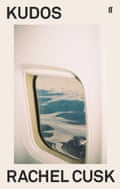
Your Silence Will Not Protect You (Silver) collects Audre Lorde’s essays and poems together for the first time in the UK. I look forward to getting stuck in to Talking to Women, Nell Dunn’s 1964 conversation about sex, money, work and art with a group of friends – including the writer Ann Quin and pop artist Pauline Boty.
My love affair with the explosive, erotic, modernist poetry of Apollinaire is the one enduring passion in my life. Many of his best poems were written when he was a soldier fighting on the front lines in WW1. It was Apollinaire who invented the word, Surrealist. In Zone: Selected Poems of Guillaume Apollinaire (NYRB), Ron Padgett’s translation from the French (Padgett wrote the poems for the bus driver poet in Jim Jarmusch’s film, Paterson) is pitch perfect and dazzling.
I will also reread four books I initially read very fast, mostly because the skill of the writing itself is the main event in all of them: The Years by Annie Ernaux, Kudos by Rachel Cusk, The Little Virtues by Natalia Ginzburg (Daunt, translated by Dick Davis) and Three Poems by Hannah Sullivan (Faber).
Hilary Mantel
If you have not already met The Secret Barrister (Macmillan), he or she makes an entertaining and acerbic holiday companion for those who don’t switch off their brains in summer; it seems our resource-starved legal system is poised on the brink of not working at all. Tessa Hadley’s short stories, Bad Dreams (Cape), are simple and artful and leave you wanting more. Didier Eribon’s memoir Returning to Reims (Allen Lane, translated by Michael Lucey) is a haunting book, fiercely political and deeply personal; I shall be thinking about it this summer and for many seasons to come.
Paul Mason
Chantal Mouffe’s For a Left Populism (Verso) is influencing left parties as they enter government, from Greece to Portugal to Mexico. It is a beach-sized introduction to a major left thinker of the 21st century. Mike Davis’s Old Gods, New Enigmas (Verso) is a challenging re-exploration of Marx in the light of the atomisation of class struggle, the climate crisis and the centrality of cities to social justice struggles. Patrick Langley’s debut novel Arkady comes beautifully presented by Fitzcarraldo. What’s not to like about a book where revolutionaries take over a city in the north of England?

Jon McGregor
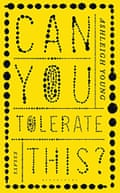
People always say not to judge a book by its cover, but people are wrong. Ashleigh Young’s collection of smart, funny, insightful and unexpected essays, Can You Tolerate This? (Bloomsbury), has a bright yellow cover, making it perfect summer reading. I love it. I’ve been telling people about Lucy Wood’s short stories ever since her debut collection came out a few years ago; she’s back with another collection, The Sing of the Shore (4th Estate), and she’s better than ever. Finally, Melissa Harrison’s forthcoming All Among the Barley (Bloomsbury) is an astonishingly good evocation of rural England in the 1930s, complete with creeping fascism and the subjugation of women. It’s subtle and mesmerising and brilliantly detailed, and I’m going to lie down in a meadow and read it all over again.
Pankaj Mishra
Fiction in English from Pakistan has redeemed its promise with dazzling consistency. Mohammed Hanif’s Red Birds (Bloomsbury) is a fresh marvel, describing with cool wit and steely yet tender intelligence the interlinked fates of antagonists in a forgotten war-scape – and the complicity of our own sheltered lives in remote conflicts. Anna Tsing’s The Mushroom at the End of the World (Princeton) is a poetic and remarkably fertile exploration of the relationship between human beings and the natural environment, and what can still be done to stem its rapid deterioration.
The term neoliberalism provokes much choleric denial. But Quinn Slobodian’s Globalists: The End of Empire and the Birth of Neoliberalism (Harvard) decisively establishes it as a coherent project, tracing it back to the political and intellectual synergies of the 1920s. Michelle Dean’s Sharp (Fleet), a portrait of 10 female writers and thinkers, is a bracing tribute to the life of the iconoclastic mind: a reminder, in our age of flashy hot takes, of the matchless power of sustained and elegant argument.
Blake Morrison
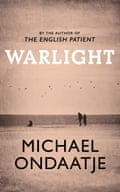
Kept from the world by a crazed fundamentalist father, cowed herbalist mother and violent misogynist brother, it’s a miracle Tara Westover escaped her childhood in rural Idaho. Her memoir Educated (Hutchinson) brilliantly recounts her journey towards knowledge and enlightenment; bravely, too – her family are still alive. With Rachel Cusk as with Karl Ove Knausgaard, you wonder what makes you keep turning the pages. But while he’s confessional, her narrator Faye lets other characters do the talking, giving little of herself away; Kudos completes a remarkable trilogy. The crepuscular, dreamlike, post-1945 London that Michael Ondaatje invents in his novel Warlight (Cape) continues to haunt you long after the plot itself.
Andrew Motion
Three Poems by Hannah Sullivan is the best first collection I’ve read for a long time: moving, technically adroit, clever in all the right ways, and full of brilliant small-scale effects as well as large achievements. Angela Leighton’s Hearing Things (Harvard) is as good as her previous book on poetic form – which is to say it’s terrific – and illuminates a great deal about the sound effects of poetry that cannot be disentangled from its page-sense. Rachel Cusk’s Kudos brings her enthralling trilogy to a well-judged conclusion, at once rounded and open.
Sarah Perry
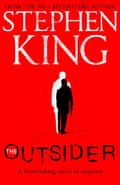
Now that Terry Pratchett is gone, Stephen King is one of the only authors I buy in hardback on publication day. His latest, The Outsider (Hodder), is both a detective and a horror novel, and it gripped me to the point of checking under the bed before I went to sleep. It reminded me of what it was like to lie reading by torchlight late at night, when camping in the summer.
I’ve never been much of a reader of contemporary poetry, but I have been seduced by some of the brilliant young poets writing now, of whom Amy Key is perhaps my favourite. Her new collection, Isn’t Forever (Bloodaxe), is playful, surreal and enchanting but also rooted in brutal emotional honesty. She is writer of a rare and strange magic.
I am lucky enough to have an advance proof of Mrs Gaskell and Me, the new book from the brilliantly gifted Nell Stevens: she describes it as a love letter to “her own very special, dear friend”, Mrs Gaskell, and I have it patiently waiting on my desk.
Michael Pollan
On my bedside at the moment: Go, Went, Gone (Granta, translated by Susan Bernofsky), a novel about the refugee crisis in Germany by Jenny Erpenbeck that is not only timely but masterful; Matt Walker’s illuminating review of the science of sleep and how we’re all doing it wrong: Why We Sleep (Allen Lane); The Overstory (Heinemann), Richard Powers’ weird and wonderful novel about the intricate relationships among trees and humans; and Carlo Rovelli’s mindbending The Order of Time.
Ian Rankin
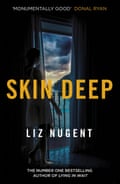
Liz Nugent’s Skin Deep (Penguin) is the perfect holiday read for those who like their escapism on the darker side. If Patricia Highsmith were Irish she might well have come up with this tale of a scarred woman who taints all she touches while remaining as charismatic as she is enigmatic.
In The Smiling Man (Doubleday) Joseph Knox pulls off the “difficult second novel” with ease and considerable style. Labyrinthine Mancunian noir with the obligatory battered but dogged detective.
Ambrose Parry, The Way of All Flesh isn’t published until late-August, but it’s a rip-roaring tale of murder amid the medical experiments of 19th-century Edinburgh. The book brings both city and period to colourful life and is a joy to read. It’s a collaboration between seasoned novelist Chris Brookmyre and his wife, consultant anaesthetist Marisa Haetzman.
Irish lawyer Steve Cavanagh writes excellent courtroom thrillers set in the US. His latest, Thirteen (Orion), sees him at the top of his game. It features a serial killer who’s sitting on a jury. Terrific premise, and the resulting story doesn’t disappoint.
Sally Rooney
I recently read Vivek Shanbhag’s Ghachar Ghochar (Faber, translated by Srinath Perur), a perfectly formed short novel about a family in India undergoing a rapid change in fortune. Published in translation last year, it’s an admirably slim book – you could read it in one sitting – and for me it conjured up a whole world.
I’d also recommend Sayaka Murata’s Convenience Store Woman (Portobello, translated by Ginny Tapley Takemori), an exhilaratingly weird and funny Japanese novel about a long-term convenience store employee. Unsettling and totally unpredictable – my copy is now heavily underlined.
Finally, I don’t think I’ll ever forget the day I spent reading Olivia Laing’s Crudo (Picador). I couldn’t put it down, and then it overwhelmed me so much I had to put it down, and then I had to pick it back up again. A beautiful, strange, intelligent novel.
Katherine Rundell
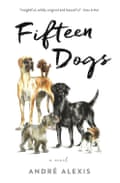
My favourite book for adults this year, by some margin, has been Fifteen Dogs (Serpent’s Tail) by André Alexis. It opens with two gods having a quiet drink at The Wheat Sheaf in Toronto and debating whether, if animals had human intelligence, they would be only as unhappy, or more unhappy, than humans. It’s unhinged, wise, sharp, witty and daring. I’ve also fallen in love with Rachel Cusk’s Outline trilogy; her work is staggering.
In the world of children’s books, I can’t wait to read Hilary McKay’s The Skylarks’ War (Macmillan), set in the approaching shadow of the first world war. McKay couples warmth and grace with wry humour like nobody else out there.
Salman Rushdie
My recent (re-)reading includes Cervantes’ Don Quixote, Vladimir Nabokov’s Lolita and Speak, Memory, Ralph Ellison’s Invisible Man, and Thomas Mann’s The Magic Mountain, all books that don’t need me to recommend them. I have, however, immensely enjoyed David Grossman’s A Horse Walks into a Bar (Cape) for its pitch-perfect black comedy and Jeet Thayil’s The Book of Chocolate Saints (Faber), easily the most original and formally inventive novel to come out of India in years.
Taiye Selasi
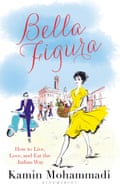
Uprooting her life, London-based Kamin Mohammadi relocated to bucolic Florence. Her glorious memoir Bella Figura is witty, intelligent and heartfelt in equal measure and will delight anyone dreaming of a summer holiday – or a brand new life – in Italy.
Recently optioned to become a film, Katja Meier’s timely memoir Across the Big Blue Sea: Good Intentions and Hard Lessons in an Italian Refugee Home avoids easy sentiment in favour of honesty and humour. The African women we meet at this Tuscan refugee home are fierce, scared, brave, vulnerable — triumphant yes, but human too. A beautifully complex account.
And finally, I cannot heap enough praise upon Freshwater, a daring, sexy debut. Raw and lyrical, Akwaeke Emezi’s semi-autobiographical narrative takes on sexuality, spirituality, family and more — all with a clarity that belies her 30 years.
Will Self
I basked in the interwar twilight of Cressida Connolly’s After the Party (Viking). The novel a beautifully written evocation of the era, and the woolly self-absorption of its party-going protagonist. However, it’s also a pitiless exercise in ideological revelation, as it becomes clear that the party in question doesn’t feature dancing until dawn and a sumptuous breakfast buffet, but men and women wearing black shirts, who greet each other with fascist salutes. In a year that’s seen bigotry of all kinds on the rise, and the storm clouds of nationalist intolerance gathering on the near horizons of Europe, Connolly’s novel achieves the rare feat of at once summoning that foreign country, the past, then returning us, uncomfortably, to a contemporary Britain with a burgeoning fatherland complex.
Elif Shafak
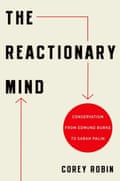
I have just finished reading The Reactionary Mind (Oxford) by Corey Robin. So many writers and thinkers today, East and West, are questioning the rise of conservatism, populism and tribalism. What makes Robin’s book extraordinary is the long-term pesrpective he introduces in this book. Robin shows that Trump is not a break from the conservative tradition, in fact, he is the fulfilment of a tradition that goes all the way back to Edmund Burke and his reaction to the French Revolution. It is a deeply thought-provoking book with utmost clarity and astonishing depth.
What struck me about Neel Mukherjee’s novel A State of Freedom (Vintage) was the mesmerising complexity and the sharpness mixed with compassion and empathy. All the stories are beautifully written, and while they remain semi-independent, they are also subtly interconnected. Long after I finished it I realized the characters were still with me, vivid, compelling, haunting.
Janesville: An American Story (Simon & Schuster) by Amy Goldstein is incredibly well-researched, empathetic and moving. Political experts and pundits talk about “the American working class” all the time, making massive generalisations without paying much attention to individual stories, but this book is extraordinary in the way it sheds light on an industrial town in America’s heartland by masterfully combining analysis and storytelling.
Kamila Shamsie
I’ve already read Tishani Doshi’s poetry collection Girls Are Coming Out of the Woods (Bloodaxe) but I know I’ll return to it many times. One of the poems talks about poets ‘holding the throat of life/ till all the sunsets and lies are choked out/ till only the bones of truth remain’ - that’s precisely what Doshi does in this intelligent, elegant, unflinching collection. It’s very much a collection for this moment in history, but one that will endure long past it.
The publishing house And Other Stories has committed to making 2018 a Year of Publishing Women – I’m planning to work my way through their entire list for the year over the summer. First up: Fleur Jaeggy’s Sweet Days of Discipline, translated by Tim Parks. It is set in a boarding school in postwar Switzerland, the opening pages are spare and beautiful, with an intriguing darkness.
Ali Smith
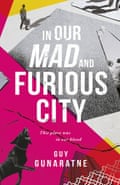
This summer the book I’m telling anyone who asks me about is Guy Gunaratne’s In Our Mad and Furious City (Tinder), a novel that’s a piece of communal vitality, choral in its urgency, one that squares up to the history of division, makes contemporary disjuncture come alive on the page, doesn’t flinch, and demands change right now. The book I’ll take with me on holiday is Michael Ondaatje’s Warlight. I love his writing, I wait for his books.
Colm Tóibín
Now that America has come to seem so unsettled and so strange, two books help us to become more alarmed. One is Michèle Mendelssohn’s Making Oscar Wilde (Oxford). It charts the early rise of Wilde, with special attention to how, during the 1880s, his lecture tours in America, a country beguiled by novelty and in need of excitement, made his name. As long as it was new, it seemed, America wanted it. Rachel Kushner’s The Mars Room is set in the American prison system, but manages to be a novel with its own worldview and its own textures, as much as a chronicle of a system that holds more prisoners per head of population than any other country in the world. On a more uplifting note, there is a wonderful doorstopper called Gillian Ayres (Art/Books), with a text by Martin Gayford and David Cleaton-Roberts and examples of Ayres’s work that will lift your heart.
Matthew Walker
Do you want to understand yourself? To understand why you say and do what you do? To know why you, and the rest of our human race, are capable of paradoxical extremes, from compassion to cruelty (even within minutes of each other)? With humour, sublime insight and supportive data, Robert Sapolsky serves up all the answers in Behave, his gem of an explanatory masterpiece.
Many of us feel that an occasional lie is fine, perhaps when trying to protect someone’s feelings, or when pressured to maintain political correctness. Lying by Sam Harris is a timely, well-reasoned treatise exposing how wrongheaded such beliefs are. It proves out the lack of utility in lying, in any scenario. Yet, that is not the reason I prescribe this book. Rather, it is the palpable sense of liberation and relief that you will feel when you practice what Harris preaches. Such is the truth about lying.
Sarah Waters

My most beguiling read lately has been Rupert Thomson’s Never Anyone But You (Corsair), a beautifully written fictionalised account of the decades-long lesbian love affair between surrealist artists and anti-Nazi activists Claude Cahun and Marcel Moore. I’m currently very much enjoying Diana Evans’s novel Ordinary People (Chatto), which takes a forensic look at the pleasures and perils of marriage and parenting and modern London living. And, as a Londoner myself, and one who likes to make as many journeys as possible by foot, the book I plan to turn to next is Lauren Elkin’s Flâneuse (Vintage), which promises to be an inspiring a piece of feminist psychogeography based on the experiences of several notable female city-strollers including Jean Rhys, Virginia Woolf and Martha Gellhorn.
Browse the books featured in this article at the Guardian Bookshop and save up to 25%. Visit guardianbookshop.com or call 0330 333 6846.
What books are you reading this summer? You can share your selections with us, either in this form or on twitter @Guardianbooks, by 10am BST Monday 9 July.
This article includes content hosted on unknown. We ask for your permission before anything is loaded, as the provider may be using cookies and other technologies. To view this content, click 'Allow and continue'.
